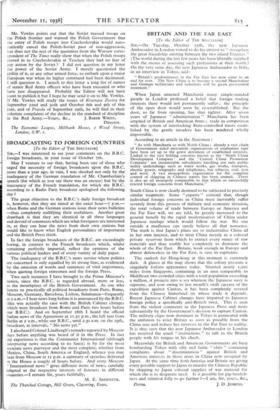BROADCASTING TO FOREIGN COUNTRIES [To the Editor of THE SPECTATOR]
Snt,—I was interested to see your comments on the B.B.C. foreign broadcasts, in your issue of October 7th.
May I venture to say that, having been one of those who urged the necessity of foreign broadcasts upon the B.B.C. more than a year ago, in vain, I was shocked not only by the inadequacy of the German translation of Mr. Chamberlain's speech (for which as you say there was an excuse) but by the inaccuracy of the French translation, for which the B.B.C. according to a Radio Paris broadcast apologised the following day ?
The great objection to the B.B.C.'s daily foreign broadcast is, however, that they are timed at the exact hour-7 p.m.— when Rome and the German stations issue their news bulletins —thus completely nullifying their usefulness. Another great drawback is that they are identical in all three languages and devoid of comments which are what foreigners are interested in, as they can hear the news from their own stations but would like to know what English personalities of importance and the British Press think.
In fact the foreign broadcasts of the B.B.C. are exceedingly boring, in contrast to the French broadcasts which, whilst remaining perfectly impartial, reflect the opinions of the various political leaders and of every variety of daily paper.
The inadequacy of the B.B.C.'s news service where politics are concerned is only equalled by its strong bias, as evidenced by the omission of words and sentences of vital importance, when quoting foreign statesmen and the foreign Press.
Two such instances I have brought to the Prime Minister's notice, since the B.B.C. is regarded abroad, more or less, as the mouthpiece of the British Government. As one who listens to practically all political broadcasts from Paris, Rome, Moscow, Germany, Barcelona, Lisbon, Salamanca—frequently at 2 a.m.—I hear news long before it is announced by the B.B.C. (this was actually the case with, the British Cabinet changes which were broadcast from Rome and Paris two hours before our B.B.C.). And on September 28th I heard the official Italian news of the Agreement at rx.so p.m., the full text from Berlin at 2 a.m., while our B.B.C., until 2.30 a.m. on the 29th, broadcast, at intervals, "No news yet."
I also heard Colonel Lindbergh's remarks reported by Moscow days before anything was heard of it in the Press. In fact my experience is that the Communist International (although interpreting news according to its fancy) is by far the most accurate news purveyor and the most complete, whether from Mexico, China, South America or England, whence you may tear from Moscow at is p.m. a summary of speeches delivered n the House a couple of hours before. And every Moscow 'International news" gives different items of news, carefully adapted to the respective interests of listeners in different countries.—! remain Sir, yours faithfully,










































 Previous page
Previous page